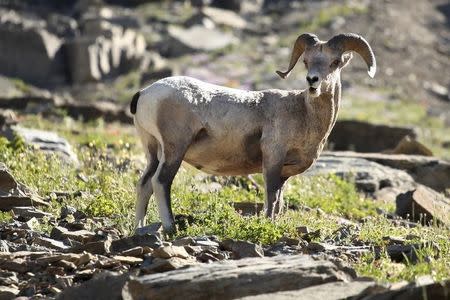
(Reuters) - The die-off of bighorn sheep from pneumonia led Montana
wildlife managers on Monday to take the unusual step of abruptly closing
a hunting season tied to a wild herd near Yellowstone National Park
whose seasonal mating rituals attract scores of wildlife watchers.
The emergency closure came after state biologists
estimated that pneumonia had claimed nearly 40 percent of a herd near
Gardiner, Montana, whose numbers fell to 55 this month from 89 last
year, state wildlife managers said on Monday.
Such pneumonia outbreaks have been linked to contact
between wild sheep and domestic ones that graze on public allotments and
private lands across the Rocky Mountain West.
More
than 1 million bighorns once roamed the region but their numbers had
fallen to just tens of thousands in the first decades of the 20th
century because of unregulated hunting and disease, according to the
Wild Sheep Foundation. Wildlife managers in Montana and other Western states have renewed efforts in recent years to reintroduce wild sheep in areas where disease and historical over-hunting pushed them close to extinction.
Bighorns are prized by sportsmen and wildlife watchers for their curled horns and for mating rituals in which rival rams crash horns after running at each other at speeds up to 40 miles per hour.
Moves by U.S. land managers to reduce the number of sheep
grazing allotments to lessen the disease risk to bighorns have been met
with fierce resistance by sheep ranchers, who say the leases of ground
are vital to their operations in states like Idaho where the majority of
land is under federal control.
Hunters and ranchers, usually in harmony about wildlife management, are divided over bighorn sheep. "It's an issue of conflict," said Bret Stansberry, landowner-sportsmen coordinator with the Idaho Department of Fish and Game.
The
pneumonia among bighorns near the northern entrance of Yellowstone marks
the first time the ailment has affected that herd, which is native
rather than reintroduced, said Montana Fish, Wildlife and Parks wildlife
biologist Karen Loveless.
Biologists have counted
at least 34 bighorn carcasses in the area and a recent survey indicated
additional wild sheep have become sick, Loveless said.
It is suspected the bighorns contracted pneumonia by
mingling with domestic sheep that graze on private lands in the
vicinity, said Loveless, adding that there is no sign yet the disease
has infected Yellowstone bighorns.
(Reporting by Laura Zuckerman in Salmon, Idaho)
No comments:
Post a Comment